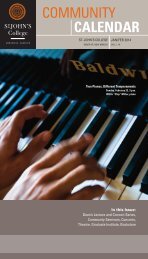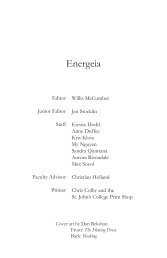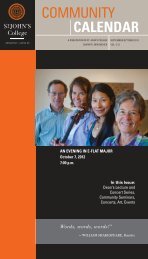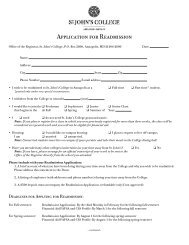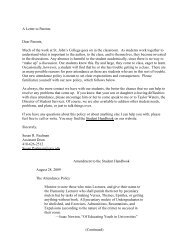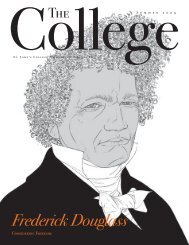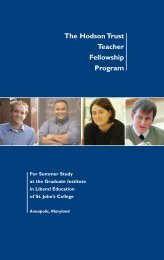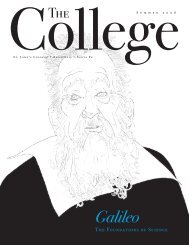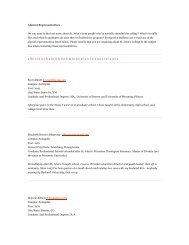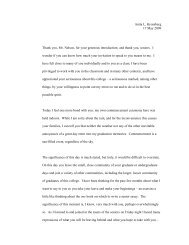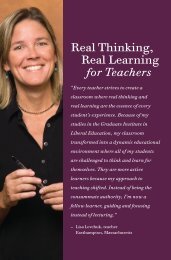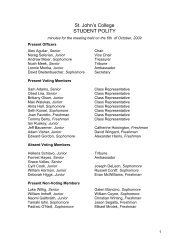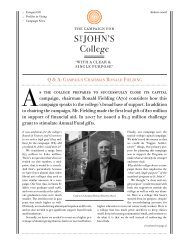âTo Meet with Macbeth,â given by tutor Louis ... - St. John's College
âTo Meet with Macbeth,â given by tutor Louis ... - St. John's College
âTo Meet with Macbeth,â given by tutor Louis ... - St. John's College
Create successful ePaper yourself
Turn your PDF publications into a flip-book with our unique Google optimized e-Paper software.
world not yet formed. Rather, let us give ourselves to the outstretched hand of desire that invites us<br />
into the secret, fantastical places of the playwright’s soul to challenge the comfortable domains of<br />
present time and place. Thus the other affect of this fearful prologue is the desire for more meetings<br />
<strong>with</strong> what we fear so that we might know all the possibilities of our becoming. (That is why we attend<br />
tragedies.) The word “more” is a ritual word in <strong>Macbeth</strong>, spoken frequently to further the action of the<br />
ubiquitous “d” words: “do,” “dare,” “deed,” “done,” “dagger,” “death,” and “double.” “Double” is a<br />
certain kind of “more” that we shall meet <strong>with</strong> the most.<br />
The three alternating voices of the Sisters form three sections of three or five lines each, mostly<br />
rhymed, each section addressing a nervous question we have: “when is this?” “where are we?” and<br />
“what are the names of note?” They also speak a final rhymed couplet. Despite several obvious<br />
deviations, Shakespeare’s sonnet form is discernible. The discipline of the sonnet helped to teach<br />
Shakespeare the playwright how to present a complete world in the afternoon form of a five act play.<br />
The distortions from regularity in the prologue make us wonder if this play will fulfill our expectations of<br />
resolution according to form. The final couplet epitomizes this wonder: “Fair is foul and foul is fair.”<br />
When opposites serve to name each other, thought and speech are confounded, noble splendor is<br />
forbidden <strong>by</strong> the fog, and filth loses its repugnance—“so, it will make us mad” (II.ii.33). The play thus<br />
addresses in the concrete form of human action the greatest of all questions: the difference between<br />
good and bad as they appear to the senses and feelings as fair and foul. Will the playwright clear away<br />
the fog and the filth of this Scottish air to let the fair and the foul things distinctly appear and be known?<br />
We shall see.<br />
The Sisters’ next meeting is “ere the set of sun” “on the heath,” an uncultivated land that could<br />
yet be planted in the last of the light. <strong>Macbeth</strong> calls the place a “blasted heath” (I.iii.77). “Blasted”<br />
indicates something pernicious that keeps the heath blighted so that not even a king could garden it.<br />
This blasted heath has inward dimensions. It is the soul of a childless, deeply introspective warrior,<br />
3



